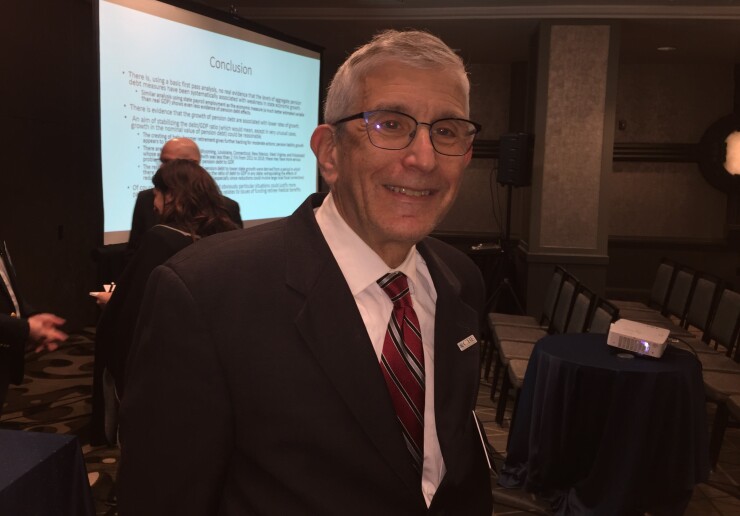There appears to be no evidence that underfunded state pension plans are a drag on an individual state’s economic growth as long as that underfunding is not growing faster that state’s economy.
That’s the preliminary finding of Charles Steindel, a former economist at the Federal Reserve Bank of New York and a resident scholar at Ramapo College in New Jersey.

“It’s preliminary in the sense that it’s not that detailed an examination,” said Steindel, who presented his analysis at the annual economic policy conference of the National Association of Business Economists.
He said that New Jersey’s troubled state pension plans could be only a couple of years away from stabilizing if his benchmark is used. “The pension debt will continue to grow but not relative to the state’s economy,” he said.
“Pension debt doesn’t seem to be a major driver of state economic performance,” Steindel said.
Alaska and Wyoming had weak economic performance in recent years and the finances of their pension plans also have worsened because of that, but their economies are tied to energy prices.
“However, if you look at the growth of pension debt you see more of what would be expected,” Steindel said.
Steady annual growth in pension debt in states does appear to have at least a one year impact on weaker economic growth, he said.
In Illinois, for instance, state pension debt has grown by about 2% annually for a generation.
Steindel said the goal for Illinois should be to at least cap the growth of its state pension debt.
The growth of pension debt also is slowing, which Steindel attributed to the fact that many of the baby boom generation of workers already have retired.
Steindel stressed that his message is not to say there’s no state pension problems but to say that the problems may have been overstated.
His analysis used both a pension database created by the Pew Charitable Trusts and another from the Federal Reserve Board.
“I wanted to see if there’s empirical evidence which path we should take at the state level to address the pension situation,” he said. “I find relatively little evidence using the two data sets that the level of debt has an effect on state economic performance and there is quite a variation of data in there.”
His presentation included many references to a study last year, "The Sustainability of State and Local Pensions: A Public Finance Approach," by Louise Sheiner of the Brookings Institution, Byron Lutz of the Federal Reserve and Jamie Lenney of the Bank of England.
The Lenney, Lutz and Sheiner paper presented at the Brookings Municipal Finance conference maintained that the crisis of state pension underfunding is overblown.
The authors of the 2019 paper said that focusing on the long-term sustainability of public pension plans rather than their underfunding as required by the of the Governmental Accounting Standards Board standards allows communities to focus on immediate pressing priorities such as reducing the lead in their drinking water.
The 2019 paper said the sustainability approach is rooted in the history of public pension plans which were not required to be fully funded several decades ago.





